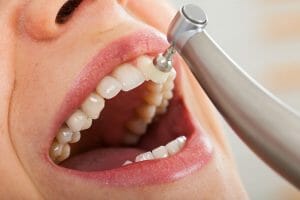Which is Better: Dentures or Dental Implants?

If you’re considering a dental restorative procedure to replace lost teeth, you understandably have a lot to think about. Both dental implants and dentures are commonly used to fill in gaps left when teeth fall out, for whatever reason.
Before you decide which is best for you, read our blog about dental implants vs dentures, so you can feel confident you’re making the right decision for your oral health. We’ll compare and contrast both so you have all the information needed to weigh your options.
What are dental implants?
Dental implants are permanent replicates of natural teeth and screw into the jawbone via a titanium post. Once the post has bonded to the jawbone and heals, your dentist will cover it with a porcelain crown that looks and acts like a natural tooth.
You may only have one dental implant to fill one gap, or you may have several to fill in multiple spaces in your teeth.
How do you care for dental implants?
You must care for your dental implant(s) as you would the rest of your teeth. That means brushing and flossing daily and being mindful of excess sugar and acidic foods and drinks in your diet.
Dental implants allow you to talk and eat normally, though when first implanted, you may feel discomfort that makes both more difficult than usual.
What are some dental implant pros?
There are many pros to choosing dental implants. The most common are:
- They look and feel like natural teeth
- They can hold up for at least 20 years
- They preserve your facial structure (unlike having gaps, which can cause a sunken appearance.)
- You can have one dental implant placed or several at a time
To learn the specific pros related to your dental care, be sure to consult your dentist.
… And the cons?
There are also a couple of cons to having dental implants placed you should know about. They include:
- Dental implants are more expensive than dentures
- If the crown cracks or falls out, you must replace it
- You may not be a candidate for dental implants if your bone or gums are unhealthy
Your dental professional will determine if you are a suitable candidate for receiving dental implants and the cons you may encounter, if any.
What are dentures?
Dentures are removable dental appliances that can replace missing teeth and gum tissue.
You may need partial dentures, which fill gaps and are worn with your natural teeth, or complete dentures, which replace all your teeth along the upper and/or lower jaw.
We make both types of dentures with an acrylic base and may have a metal framework.
While complete dentures cover the entire gum line, we attach partials to clasps on natural teeth or crowns. We also make dentures that anchor to implants and snap in place for a better fit and more secure hold.
How do you care for dentures?
Dentures are simple to care for. Because they are functional and help you eat, they can get food stuck in them, just like our natural teeth.
Because of this, it’s important to remove and rinse your dentures after meals. You should also brush your natural teeth and gums before replacing your dentures.
Just as you do with your natural teeth, you must brush your dentures twice a day. Place them in a glass with denture solution overnight to soak.
It’s also critical to handle your dentures with care when you insert and remove them. They’re fragile and susceptible to bends and breaks if handled roughly.
What are some pros to wearing dentures?
Like with dental implants, there are many pros to having dentures. Some of these include:
- While we must anchor dental implants to bone, that is not the case with dentures, and therefore those with bone and gum loss can wear them, too.
- Dentures are less expensive than dental implants.
- Your dentist can create and place partial and full dentures over just a few visits.
- Dentures are non-invasive, unlike dental implants.
The specific upsides you may experience wearing dentures over dental implants will be explained to you by your dentist.
… And the cons?
There are also a few downsides to choosing dentures over dental implants, such as:
- Dentures are more difficult to get used to and can make eating and speaking awkward initially.
- If you don’t care for your dentures per your dentist’s instructions, your gums can become infected.
- Over time, you’ll likely have to undergo adjustments at your dentist’s office if they feel tight, loose, or sore.
For the most part, dentures have downsides that most people get used to. Consult your dentist if you worry about any aspect of choosing dentures over dental implants.
Should I choose dental implants or dentures?
Whether you choose dental implants or dentures is completely up to you. After reading this blog, take time to think about your particular needs, such as:
- Budget: what you can afford and what your dental insurance covers.
- Convenience: do you mind paying more for the convenience of dental implants?
- Oral health: do you only have a single tooth gap or maybe only a couple? If you have many missing teeth, dentures may make more sense.
While the battle of dental implants vs dentures may continue indefinitely, we at O’Connor Dental Care want you to feel assured that you can come to us with any questions or concerns you may have.











